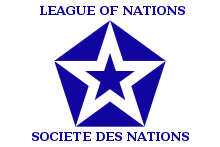(Source: Wikipedia)
We learned of a
Call for Papers for a conference, to be held at Melbourne Law School in July 2019,
on the League of Nations.
Conveners: Luís Bogliolo, Kathryn Greenman, Anne Orford, and Ntina Tzouvala.
Confirmed
Keynote Speaker: Professor Balakrishnan Rajagopal
(Department of Urban Studies and Planning, Massachusetts Institute of
Technology)
Almost a hundred
years after the creation of the League of Nations, it is still commonly
remembered as a failure in a period of chaos and disorder. Recently, however, a
growing literature has begun a reappraisal of this historiography, looking at
the role of the League of Nations beyond its frustrations and disillusionments
in collective security. This new surge of critical studies has led to a more
complex and multifaceted understanding of the League, exploring its legacies
and impacts at a time of renewed economic crises and of deepening conflicting
visions of international order. In the centenary of its foundation, we are
taking this further by looking at the League of Nations with a view from the
South. Our aim is to decentre the League and to explore competing visions of
international order, law and institutions that resonate in our contemporary
world.
This conference
will bring together scholars working in law, history, international relations,
and political theory to think critically about the League of Nations, law,
institutions, practices, ideologies and technologies in relation to or with a
view from the South. Paper proposals related to the conference theme are now
invited. Possible topics for
papers include:
- The League of Nations and the
regulation of international violence
- Sovereignty, empires, and the
shifting boundaries of international authority
- Intervention (military, economic,
political) in the context of the League
- Anti-colonialism, the rise of
transnational social movements (socialism, feminism, national liberation)
- Competing internationalisms and
visions of international order
- The rise of fascism and Nazism
- Petitioning, oversight, publicity
and new arenas of international politics
- Humanitarianism,
humanitarian assistance and governance
- Adjudication, arbitration, and the
Permanent Court of International Justice
- The relationship between the
League of Nations and contemporary or succeeding international
institutions
- The Mandates
system
- Indigenous peoples and the League
of Nations
- Codification and the role of
international law
- Major crises of the League of
Nations (eg Ethiopia, Manchuria)
- Economic and social regulation and
authority
Abstracts of no
more than 350 words should be submitted to Dr Ntina Tzouvala
(konstantina.tzouvala@unimelb.edu.au) by the 30th of November 2018.
More information
here


No comments:
Post a Comment
Note: Only a member of this blog may post a comment.